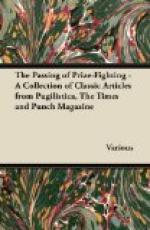A splendid warrior; in private life a bit of a Don Juan, perhaps; but his womenfolk bear him no grudge on this score, liking themselves to sail easy through matrimonial seas.
When I returned to the depot a month ago there were tales, but, as our old Subadar-Major observed, “War brought little disturbances. The mischief was unfortunate, perhaps, but not irremediable,” and, as the Subadar had himself been on service in China for a matter of three years, he knew what he was talking about.
As for the tales, well, I was reminded of them a few days ago on making a tour of the lines to see that quarters were clean and habitable for the next batch of invalids. There would be hospital for some, for others the sunny little married quarters, and round there wives were bustling with glee, making no secret of their late coquetries, but manifestly glad of the return of their former lords.
Brass pots were being scoured in the doorways; babies sprawled in the sun; a smell of cooking sweetmeats filled the air; a band of small urchins in the roadway, wearing the sham accoutrements of war, was prancing blithely to the song of “Lang-taraf-Tippalaerlee,” and as their leader pulled up to give me a grave and perfect salute I recognised the son of old Bahadur Rai.
Now Bahadur Rai would be returning, and, as I recalled the man, I wondered how he would take the news of Bibi, his capricious wife, for I had heard (unofficially) that she had no intention of leaving the lines of the 2nd Battalion, or the dashing young Naik Indrase. This might be a bit awkward, I mused, remembering the tough little chap who had been so popular with us all by reason of being the best shikari in the regiment. His incorrigible love of sport may have made the defaulter’s sheet ugly (and there’s no denying that “Absent with leave” does not lead to quick promotion); but that was in the good old days. Now he was returning covered with glory, and I was sorry about Bibi.
The train arrived at noon with what our travelled Babu calls the “blissies.” They were nearly all marked “P.D.”, and I hope it may be given to me to look as cheerful when my turn comes to be Permanently Disabled.
It was worth a week’s pay to see the grins on their brown puckered faces and hear their husky contented salaams as they were lifted from the train. Blankets, top-coats, pillows, and other items belonging to the State were gaily abandoned, but every man clung with tenacity to his tunic and his water-bottle, for was there not a collection of trophies in those bulging pockets and sea-water in those battered bottles? Real salt sea-water, for the taste and enlightenment of incredulous elders.
Outside the station the usual crowd had gathered, where it disported itself like a herd of wild elephants. Veteran bandsmen played the regimental march; casual minstrels blew conches or banged tom-toms; and when at last the ambulance waggons moved off, drawn by oxen that wore blue bead necklaces, and marigolds over their ears, one had the proud satisfaction of feeling that the most perfect organisation in the world could not have given our fine fellows a reception more after their own hearts.




